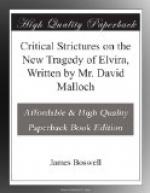Don Pedro [son of Alonzo IV, King of Portugal] and Elvira [maid of honour to the Queen, who is the King’s second wife, and is mother of the King of Spain] are privately married—the King insists that his son should marry Almeyda [the Queen’s daughter, sister to the King of Spain]—he acknowledges his love for Elvira—she is committed to the custody of the Queen—Don Pedro takes up arms to rescue Elvira—he forces his way into the palace—she blames him for his rashness—the King enters, and Don Pedro throws away his sword—Don Pedro is first confined to his apartment, and then condemned to death—Almeyda, who is in love with Don Pedro, does her utmost to save him—she prevails on the King to give Elvira an audience—Elvira avows her marriage, and produces her two children—the King pardons his son—Elvira dies, having been poisoned by the Queen—Don Pedro offers to kill himself, but is prevented by his father.[7]
The play had a respectable run, in spite of its colliding with the Half-Price Riots, but contemporary accounts appear to indicate that it was not highly thought of by the judicious. I extract the following terse criticism from a letter in the St. James’s Chronicle for 20 January, the day after the play opened:
A Brief Criticism on the New Tragedy of Elvira
Act I. Indifferent.
Act II. Something better.
Act III. MIDDLING.
Act IV. Execrable.
Act V. Very Tolerable.
Dempeter later regretted his share in Critical Strictures on the ground that neither he nor his collaborators could have written a tragedy nearly so good. The Critical Review, in which Mallet himself sometimes wrote, characterized the pamphlet as “the crude efforts of envy, petulance, and self-conceit.” “There being thus three epithets,” says Boswell, “we, the three authours, had a humourous contention how each should be appropriated."[8] The Monthly Review was hardly less severe. It conceived the author of Critical Structures to be either a personal enemy of Mallet’s or else a bitter enemy of Mallet’s country, prejudiced against everything Scotch. The reviewer could not but look upon this author “as a man of more abilities than honesty, as the want of candour is certainly a species of dishonesty."[9]
It was natural to infer that Critical Strictures was motivated by prejudice against Scotland. It appeared in the days of Wilkes’s North Briton and shortly after Charles Churchill’s Prophecy of Famine, that is, at the height of the violent anti-Scotch feeling which the opponents of Bute (a Scotsman by birth) had stirred up and were exploiting in order to force him out of office. But the critics might have remembered that the most savage criticism of any Scot generally comes from other Scots who think he has not remained Scotch enough; as witness, by what new appears to be retributive justice, the general Scots dislike of Boswell himself. At any rate, the pamphlet was the production, not of one Englishman imbued with a hatred of all things Scots, but of three warmly patriotic Scotsmen.




